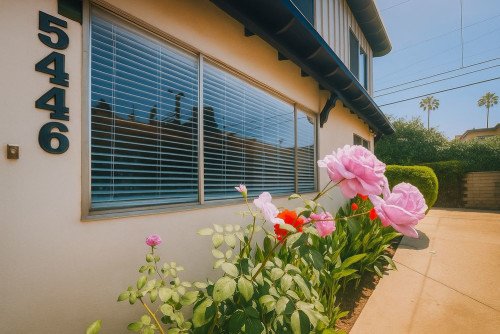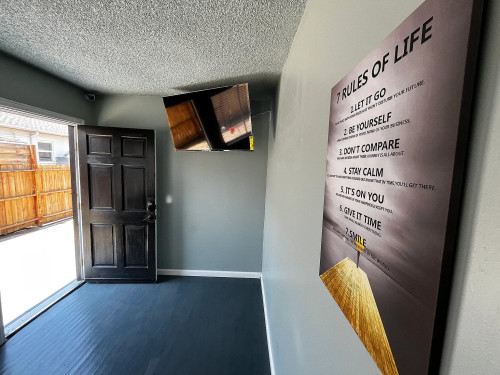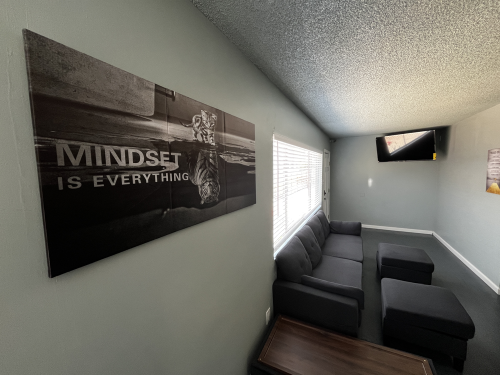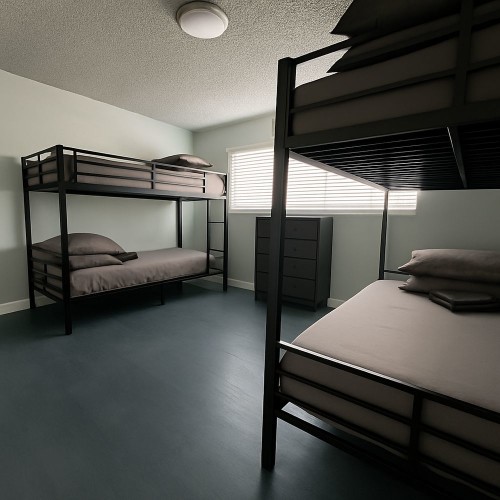






Safe Blue Heaven
Treatment Focus
This center primarily treats substance use disorders, helping you stabilize, create relapse-prevention plans, and connect to compassionate support.
Primary Level of Care
Transitional housing designed to support individuals recovering from substance use disorders offering a safe, supportive and structured environment for practicing long-term sobriety, while reintegrating back into daily living.
Claimed
Recovery.com has connected directly with this treatment provider to validate the information in their profile.
Treatment Focus
This center primarily treats substance use disorders, helping you stabilize, create relapse-prevention plans, and connect to compassionate support.
Primary Level of Care
Transitional housing designed to support individuals recovering from substance use disorders offering a safe, supportive and structured environment for practicing long-term sobriety, while reintegrating back into daily living.
Provider's Policy
Safe Blue Heaven accepts insurance, as well as cash payments via PayPal and Zelle. Flexible payment plans are available for individuals awaiting Supplemental Security Income (SSI) or recently discharged from treatment. Contact to confirm coverage and secure your spot.
Safe Blue Heaven
Safe Blue Heaven
About Safe Blue Heaven
Established in 2025, Safe Blue Heaven is a sober living home in Valley Village offering structured, substance-free housing for adults in early recovery. It supports individuals transitioning from treatment, parole, or homelessness through affordable sober living, bridge housing, and payment flexibility—including options for those awaiting supplemental security income (SSI). The home’s mission is to provide a safe, respectful space where healing and stability can begin.
Rebuild Through Daily Routine
The program promotes recovery through structure, peer accountability, and connection to outpatient services. Residents follow clear house rules and receive guidance from a supportive team, including intake managers and community partners such as intensive outpatient programs (IOPs), hospitals, and case managers. Safe Blue Heaven emphasizes daily stability and healthy routines through its zero-tolerance policy and consistent peer support.
Recover With Comfort and Care
Clients live in fully furnished shared rooms with large windows, shared living spaces, and modern kitchen access. Amenities include disability-compliant housing and rooms, 24/7 security cameras, optional transportation assistance, and an available meal plan offering three meals daily. The home is located near public transit and local recovery meetings, making it easy to stay connected and supported.
Center Overview
Treatment Focus
This center primarily treats substance use disorders, helping you stabilize, create relapse-prevention plans, and connect to compassionate support.

Insurance Accepted
Pricing and Program Length
Estimated Center Costs
Center pricing can vary based on program and length of stay. Contact the center for more information. Recovery.com strives for price transparency so you can make an informed decision.
Levels of Care





Treatment
Specializations
Alcohol
Using alcohol as a coping mechanism, or drinking excessively throughout the week, signals an alcohol use disorder.
Chronic Relapse
Consistent relapse occurs repeatedly, after partial recovery from addiction. This condition requires long-term treatment.
Drug Addiction
Drug addiction is the excessive and repetitive use of substances, despite harmful consequences to a person's life, health, and relationships.
Who We Treat
Men and Women
Men and women attend treatment for addiction in a co-ed setting, going to therapy groups together to share experiences, struggles, and successes.
Approaches
Personalized Treatment
The specific needs, histories, and conditions of individual patients receive personalized, highly relevant care throughout their recovery journey.
Therapeutic Community
Therapeutic communities allow patients to contribute to the success and progress of their community, through healthy behaviors or even basic chores.
Therapies
Life Skills
Teaching life skills like cooking, cleaning, clear communication, and even basic math provides a strong foundation for continued recovery.
Psychoeducation
This method combines treatment with education, teaching patients about different paths toward recovery. This empowers them to make more effective decisions.
Relapse Prevention Counseling
Relapse prevention counselors teach patients to recognize the signs of relapse and reduce their risk.
Substances We Treat
Alcohol
Using alcohol as a coping mechanism, or drinking excessively throughout the week, signals an alcohol use disorder.
Chronic Relapse
Consistent relapse occurs repeatedly, after partial recovery from addiction. This condition requires long-term treatment.
Drug Addiction
Drug addiction is the excessive and repetitive use of substances, despite harmful consequences to a person's life, health, and relationships.
Languages
Aftercare
Experience
Personal Amenities
Special Considerations
Transition Program
Patients in a transition program gradually return to life outside treatment, helping lower chances of relapse and continue care in a less intense setting.

We love hearing about your treatment experience
Help individuals and families seeking treatment by sharing your first-hand experience with this treatment provider. Review Guidelines.





